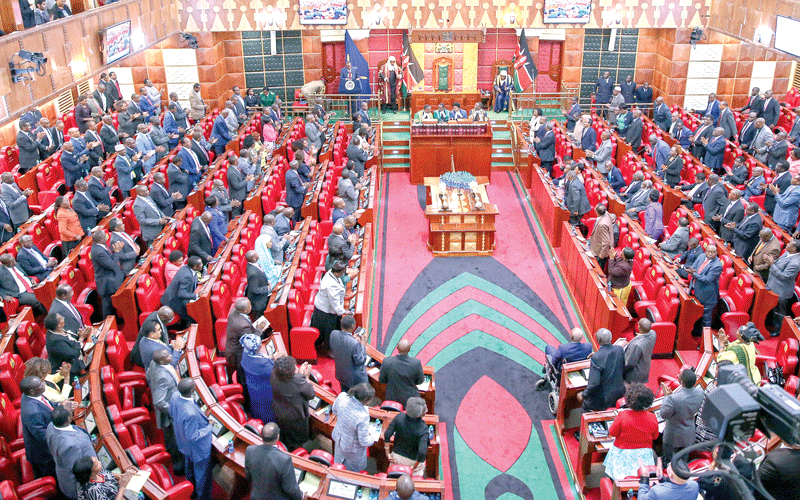MPs walk into Christmas a billion shillings poorer

Bernice Mbugua @bernicemuhindi
Members of Parliament and senators suffered a major blow yesterday after the High Court ordered them to refund Sh1 billion they have been earning in house allowances.
The three-judge bench ordered clerks of the Senate and the National Assembly to recover in full the Sh1.2 billion from the lawmakers’ salaries and allowances within a period of 12 months. This means each MP will pay Sh2.8 million within the said period.
The MPs had awarded themselves Sh250,000 in monthly house allowances backdated to October 2018.
But in a quick rejoinder, the National Assembly Clerk Michael Sialai disputed the Sh2.8 million figure, arguing that the lawmakers would only be required to surrender Sh1 million if the ruling was to stand.
“The Parliamentary Service Commission (PSC), using a Court ruling that had stated that Deputy Governors were entitled to house allowance, and given that all public officers including Cabinet Secretaries are entitled to house allowance/accommodation facilitation, processed payment of house allowance to Members of Parliament and informed the SRC.
The Amount approved was Sh250,000 subject to 30 per cent tax,” Sialai explained in a statement.
Clerk’s clarification
He said the National Assembly only paid Sh357 million before the Salaries and Remuneration Commission (SRC) moved to court to block the payments. “The National Assembly paid only Sh357,039,516 for five and half months, before SRC obtained stay of execution.
Thus only an amount of Sh1,023,035 per MP would have to be recovered if the ruling is sustained.”
In June last year, the High Court stopped the PSC from paying MPs the disputed house allowance pending the hearing of the suit, which had been filed by SRC and activist Okiya Omtatah.
SRC petitioned the court to recover the said allowances, arguing the MPs disregarded constitutional provisions that gave the commission sole mandate of setting salaries and allowances for State and public officers.
In the ruling yesterday, Justices Pauline Nyamweya, Weldon Korir and John Mativo said the approval of the payment of an accommodation or house allowance to MPs is a function that is exclusively vested in the commission.
“An order is hereby issued quashing the decision by the PSC to set, and approve the payment of an accommodation or house allowance to MPs contrary to the structure of Remuneration and Benefits of all State Officers in Parliament without the approval of the SRC.”
The judges ruled that the more practical role of the PSC is to ensure that Parliament as an institution is well resourced and able to function effectively, so as to achieve the needed parliamentary autonomy.
However, the Constitution and statutes do not give the PSC any specific function to set the salaries and allowances of MPs and parliamentary staff, and that on the contrary, vests this function on the SRC.
“We note that the only financial functions allocated to the PSC by the Constitution are budgetary.”
The Judges noted that PSC did not consult SRC in setting the impugned allowance and making the payment.
“PSC’s decision is found to be ultra vires its constitutional mandate and to offend the principle of legality which requires that decisions by public bodies must have their source at the law,” noted the judges.
The Judges noted that SRC acted within its mandate by directing the Clerks of Parliament not to pay the impugned allowance, and did not in any manner interfere with the constitutional independence and functions of Parliament and the PSC.
“Having found that PSC contravened several constitutional provisions, we also found that the accounting officers for the PSC and Parliament are therefore also culpable for failing to undertake their obligations under the Public Finance Management Act in this regard,” ruled the Judges.
National Assembly Speaker Justin Muturi had spiritedly defended the allowance, on grounds the lawmakers, just like other state officers, were entitled to the perks.
“We acted on the court ruling of October 5, 2018 by Justice Chacha Mwita in the case of deputy governors, where he affirmed that all state officers are entitled to housing benefits,” said, who chairs the PSC.
“Contrary to popular belief, every benefit extended to legislators, even long before the housing one, has been determined by the SRC.
Curiously, the same benefits have been extended to the Executive and the Judiciary but without any undue focus.”
MPs also defended the controversial decision to award themselves the hefty allowances despite public uproar it had caused.
They hit out at the SRC for what they termed as discrimination when it came to awarding benefits to state officers.
State officers
“Why is the welfare of other state officers catered for but when it comes to MPs, it is always greed even when it is expressly provided for in the law?” said Mumias East MP Ben Washiali, who was the Majority Whip in the National Assembly at the time. He has since been replaced by Navakholo MP Emmanuel Wangwe.
The decision drew outrage from Kenyans given that the lawmakers are already entitled to Sh20 million mortgage with 3 per cent interest, making them top the list of the highest paid lawmakers in the region and even surpassing their counterparts in most of the developed countries.
A 2013 study by the UK-based Independent Parliamentary Standard Authority and the International Monetary Fund ranked Kenyans MPs as the second highest paid lawmakers in Africa after Nigeria, way above their counterparts in Ghana, Indonesia and South Africa.
Kenyan MPs were also found to earn more than their counterparts in the United States, Japan and Britain.
The 416 MPs — 349 in the National Assembly and 67 in the Senators — earn 54 per cent less than their Nigerian counterparts, whose annual take-home pay is Sh16.5 million.
Currently, MPs take home Sh710, 000 as basic salary and a number of allowances, meaning each member get a minimum of Sh1,378, 000. The allowances include mileage, sitting, responsibility perks.
In addition to the lucrative allowances, MPs also enjoy a Sh5 million official car grant scheme to buy luxury cars every five-year term, a personal car loan from the government of as much as Sh7 million repayable at an all-time low interest of three per cent interest.
They are also entitled to a weekly mileage allowance of Sh109 per kilometre for as many as 750 kilometres per week and monthly car maintenance allowance of Sh356,525.










